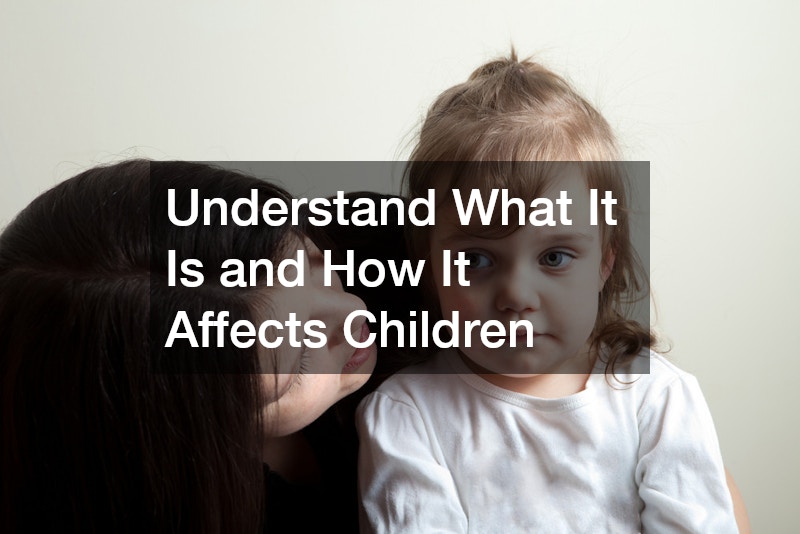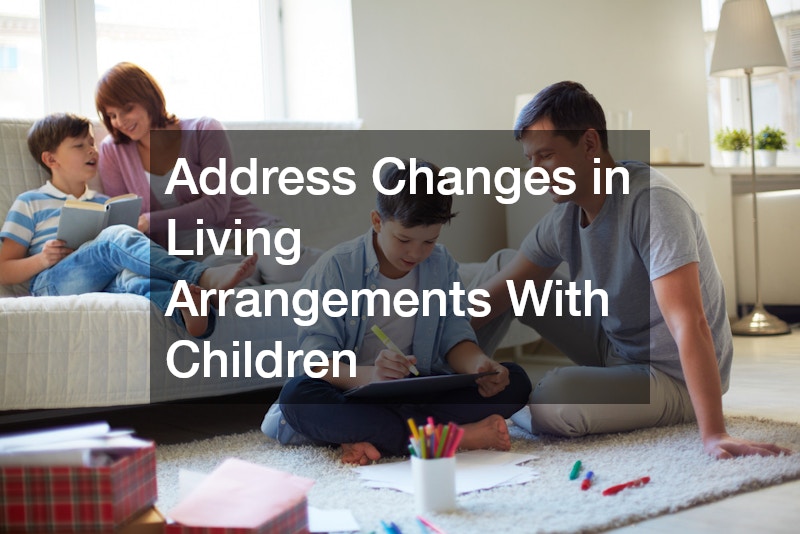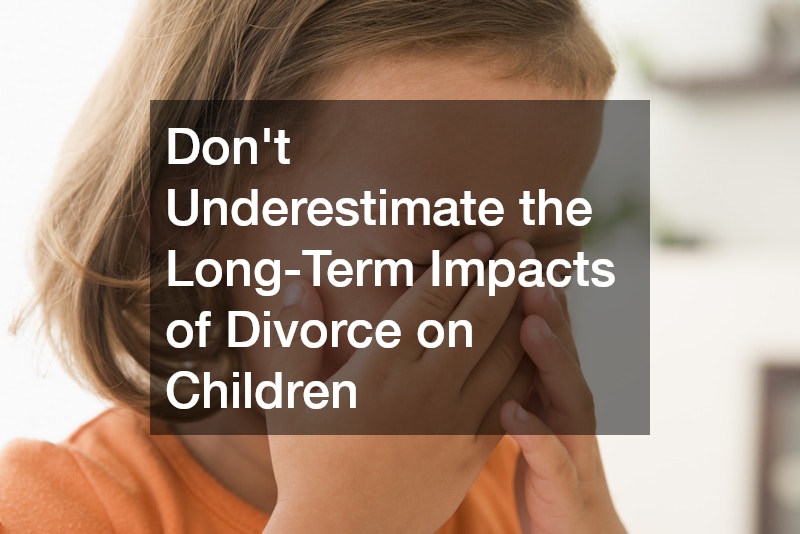Divorce, particularly a stipulated divorce, can significantly impact the lives of children caught in the midst. As parents, it is crucial to recognize that while the separation process may be amicable, it still presents a seismic shift in family dynamics that children have to adjust to. The emotional, social, and academic well-being of children can all be affected, making it essential to approach the transition with sensitivity and care. Understanding the importance of cushioning the effects of a stipulated divorce on children will better equip parents to guide their children into stable new routines.
Children view the world through the lens of their family structure, and even when parents divorce on agreeable terms, this structure shifts dramatically. Therefore, addressing the emotional needs of children while managing practical changes can empower both parents and children to emerge stronger from the experience. This comprehensive guide aims to provide critical insights and assistance as you navigate the complex yet potentially harmonious waters of a stipulated divorce.
- 1. Understand What It Is and How It Affects Children
- 2. Prepare to Discuss Divorce With Your Children
- 3. Consider Effective Co-Parenting Strategies Post-Divorce
- 4. Address Changes in Living Arrangements With Children
- 5. Keep Your Home Safe and Comfortable for Your Children
- 6. Know Which Legal Considerations You Should Be Aware Of
- 7. Ensure Educational Continuity for Your Children
- 8. Consider the Role Having Pets Can Play
- 9. Handle Quality Time and Special Occasions Properly
- 10. Don’t Underestimate the Long-Term Impacts of Divorce on Children
1. Understand What It Is and How It Affects Children

A stipulated divorce, commonly known as an uncontested divorce, occurs when both parties agree on all major issues, such as property division, child custody, and spousal support, without courtroom intervention. This type of divorce often minimizes conflict and promotes a quicker, potentially less painful dissolution of marriage. However, the impact on children is still significant, as the family dynamic undergoes a fundamental transformation.
The reduction of legal altercations during a stipulated divorce offers a peaceful environment in which children can feel safer emotionally and mentally. It also provides parents with more time to focus on supporting their children. Nevertheless, children can still sense the emotional turbulence that often accompanies this life-changing transition. Acknowledging and addressing their feelings is crucial in helping them cope with the changes.
To fully understand the implications of a stipulated divorce, parents should consider seeking divorce legal advice. Consulting with a family law lawyer provides clarity on legal implications, ensuring that the agreement reached benefits all parties involved, especially the children. Furthermore, legal guidance can offer insights into additional ways to shield children from unnecessary emotional strain.
2. Prepare to Discuss Divorce With Your Children
Discussing divorce with children requires thoughtful preparation and ideally involves both parents presenting a united front. It is important to tailor the conversation to their age and understanding level, ensuring clarity without overwhelming them with unnecessary details. The goal should be to reassure them about their significance and the continuity of parental love despite the imminent changes.
Utilizing the services of a local divorce lawyer can prepare parents for this complex discussion by helping them understand what legal terms need communication to ensure transparency. Legal professionals can offer tailored advice on how to address questions children might have regarding custody arrangements or changes in living environments. They may also suggest involving a child psychologist for guidance on how to communicate effectively with children about divorce.
Creating a safe space for open dialogue encourages children to express their feelings, whether they are confused, sad, or angry about the divorce. Parents should avoid making disparaging remarks about each other, as this can further complicate the child’s emotions. Instead, focus on empowering children with truthful reassurances and a stable, consistent routine.
3. Consider Effective Co-Parenting Strategies Post-Divorce
Co-parenting after a stipulated divorce can be significantly smoother when both parents agree to prioritize their children’s well-being above all else. Setting aside personal differences and focusing on effective communication is crucial for creating a supportive environment for children. Consistency between two households minimizes confusion and provides stability.
Engaging a local divorce mediator can be instrumental in developing co-parenting strategies that benefit children. Mediators facilitate productive discussions, enabling parents to establish guidelines that are in the best interest of their children. This professional support can prevent misunderstandings and disputes, helping parents maintain a positive co-parenting relationship.
Consistent scheduling that aligns with both parents’ availability and the children’s routine is key in successful co-parenting. Parents should strive to be flexible and considerate, ensuring their children’s needs are met first. Joint participation in school events, extracurricular activities, and even church youth activities demonstrates unity and reassures children of their continued importance despite the divorce.
4. Address Changes in Living Arrangements With Children

Changes in living arrangements are an inevitable consequence of most stipulated divorces, often causing anxiety and fear of the unknown in children. Transparency with children about what to expect can alleviate stress and help them adjust to their new reality. Parents must discuss these changes as early as possible to give children ample time to prepare for their transition.
Employing packing services to assist with the move can ease the logistical burden and give parents more time to focus on their children’s emotional needs. Involving children in the process by allowing them to choose some aspects of their new room can give them a sense of control and comfort in their new home. This involvement can transform apprehension into excitement about creating a new space that reflects their personality.
Planning visits to the new home ahead of the move date can help children become familiar with their new environment. This opportunity allows children to visualize their new routine, making the eventual transition smoother and more predictable. Parents should emphasize that while homes may change, family bonds will remain a constant source of love and support.
5. Keep Your Home Safe and Comfortable for Your Children
Creating a safe and comfortable living environment post-divorce is vital for children’s mental and physical well-being. A low-stress atmosphere allows children to feel secure and make a smoother transition into their new lifestyle. Ensuring the home is welcoming contributes positively to their emotional adjustment during this period of change.
Conducting regular home maintenance, such as employing a mold removal service, can eliminate any health hazards and reinforce the belief that their well-being is a top priority. Children deserve a space that is healthy, and addressing such maintenance concerns promptly is a step toward creating a stable home environment. Parents should strive to make sure that both homes are equally inviting and equipped to fulfill the needs of their children.
Moreover, establishing a familiar routine in the home, consistent with pre-divorce patterns, can bolster children’s sense of normality. This routine extends to hobbies, schoolwork, meals, and bedtime, ensuring that despite changes, the foundation of their daily life remains undisrupted. Such continuity in daily activities serves as a reassuring anchor for children amid the chaos of a stipulated divorce.
6. Know Which Legal Considerations You Should Be Aware Of
Legal considerations, while seemingly straightforward, still require careful examination to protect the interests of all involved, particularly the children. Having clear knowledge of your rights and responsibilities goes a long way in avoiding complications as the divorce progresses. It’s crucial to ensure that all legal agreements reflect the family’s needs accurately.
Consulting with a family law lawyer provides the necessary legal guidance to navigate and address any potential disputes that could arise. These professionals can offer advice on a range of issues, including custody arrangements and financial obligations, with the primary goal of securing the children’s best interests. Clarity in these matters sets a strong foundation for a more secure future for the children.
Parents should also be mindful of maintaining legal documentation and complying with established court orders diligently. Consistent communication with legal professionals ensures all aspects of the divorce are handled efficiently and with the children’s welfare as a priority. Following these guidelines protects the family’s long-term stability and harmonious co-existence.
7. Ensure Educational Continuity for Your Children

Academic stability can act as a strong anchor for children during the upheaval of a stipulated divorce. Ensuring educational continuity is critical in providing a semblance of routine and familiarity which children often crave in times of change. Parents must prioritize this aspect of their children’s lives to mitigate feelings of instability and disorientation.
Before the divorce process even begins, both parents can assess options within local school districts and after school programs. Maintaining involvement in educational matters, such as parent-teacher meetings and academic performances, sends a strong message of concern and involvement. Parents should engage with school counselors who can provide additional emotional support for students experiencing significant changes at home.
Additionally, extracurricular activities, akin to academics, contribute positively to emotional and social development. Encouraging children to continue their participation in horseback riding lessons or other favorite activities aids in channeling energy productively while promoting a sense of normalcy. These pursuits serve as a distraction from divorce-related stress and provide a healthy outlet for emotional expression.
8. Consider the Role Having Pets Can Play
Pets often provide substantial emotional support for children, acting as a source of comfort and consistency during a stipulated divorce. The presence of a beloved pet can ease loneliness and stress, making the transition smoother for children adapting to a separation. Understanding the pet’s role can enrich the support system that children rely on throughout the divorce process.
Very often, animals such as dogs become crucial allies in aiding children’s emotional resilience due to their unconditional companionship. Engaging the services of dog training can further enhance this bond by ensuring that the pet exhibits desirable behavior, making the child’s environment more serene. Pets that are well-trained contribute to a stable home environment, thereby reducing potential stressors.
The decision of who gets to keep the family pet post-divorce should be carefully considered with the children’s emotional needs in mind. If possible, sharing custody of the pet or facilitating regular visits ensures continuity and minimizes disruption in the child-pet relationship. This can be an additional way to foster stability and joy in the daily lives of children navigating a new family dynamic.
9. Handle Quality Time and Special Occasions Properly
Special occasions, such as birthdays and holidays, can magnify feelings of loss and division in the wake of a stipulated divorce. Strategic planning and collaboration between parents can transform these times into opportunities for positive reinforcement of familial love and unity. Establishing new traditions while preserving cherished ones helps children look forward to these occasions rather than dread them.
Allocating quality time with each child separately and together fosters strong emotional bonds and reinforces a sense of belonging. Participation in shared activities, such as horseback riding lessons or other family-friendly adventures, can be a joyful escapade away from everyday stresses. These planned outings create lasting happy memories and provide essential one-on-one engagement kids may crave post-divorce.
Clear communication and cooperative planning between parents strengthen the framework for celebrating special days meaningfully. Presenting a unified parental approach in hosting these gatherings signifies stability despite changes in household dynamics. Such efforts reassure children that love continues to be a guiding force in family traditions, providing comfort throughout the journey of co-parenting.
10. Don’t Underestimate the Long-Term Impacts of Divorce on Children

While a stipulated divorce may immediately seem less traumatic due to its amicable nature, the ramifications can be long-lasting and deeply rooted in children’s emotional development. Proactively addressing potential behavioral issues resulting from the divorce offers children the best chance of adapting successfully to new circumstances. It is essential to be patient and attentive to behavioral cues that might indicate distress.
Engaging children in supportive activities, such as church youth activities, provides an outlet for emotional expression and promotes healing. These settings nurture a shared sense of community and friendship, helping children feel understood and less isolated. Involvement in such groups can ease common post-divorce challenges like social disconnection or decreased interest in communal participation.
Parents must remain vigilant and prepared to intervene with appropriate actions, such as counseling or psychological support, to address any concerning changes in behavior. Building resilient children who possess coping tools to handle family transformations is a gradual process. Open communication, continuous support, and prioritizing well-being lay a strong foundation for children despite the enduring impact of a stipulated divorce.
Navigating a divorce is a complex journey that requires careful handling of both legal and emotional challenges. Understanding what a stipulated divorce entails, preparing children for conversations, and implementing effective co-parenting strategies play a notable role in reducing stress. Additionally, addressing living arrangements, maintaining a secure environment, ensuring educational and social continuity, and acknowledging the long-lasting effects are crucial steps. With proper guidance, a focus on well-being, and open communication, the journey through divorce can lead to stronger family bonds and healthier adjustments for all members.
